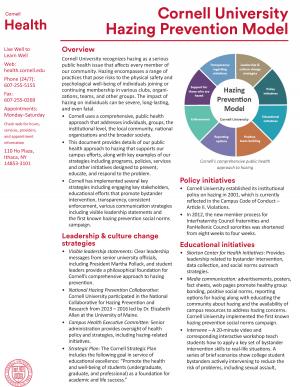Hazing Prevention Model
Public Health Approach
Preventing hazing requires a comprehensive approach involving multiple strategies.
Cornell University takes a campus-wide, public health approach to preventing hazing, which includes seven key areas.
- Students, staff, faculty, alumni, parents, and community members each have a role to play.
- Effective prevention requires understanding the complex factors that contribute to hazing.
Our Campus Model

View / print Cornell's Hazing Prevention Model fact sheet
Details
Click on the links below to learn more about each topic in our Hazing Prevention Model:
Visible leadership statements: Clear leadership messages from senior university officials, including President Martha Pollack, and student leaders provide a philosophical foundation for Cornell’s comprehensive approach to hazing prevention.
National Hazing Prevention Collaborative: Cornell University participated in the National Collaborative for Hazing Prevention and Research from 2013 – 2016 led by Dr. Elizabeth Allan at the University of Maine.
Campus Health Executive Committee: Senior administration provides oversight of health policy and strategies, including hazing-related initiatives.
Strategic Plan: The Cornell Strategic Plan includes the following goal in service of educational excellence: “Promote the health and well-being of students (undergraduate, graduate, and professional) as a foundation for academic and life success.”
Cornell University established its institutional policy on hazing in 2001, which is currently reflected in the Campus Code of Conduct – Article II. Violations.
In 2012, the new member process for Interfraternity Council fraternities and PanHellenic Council sororities was shortened from eight weeks to four weeks.
Skorton Center for Health Initiatives: Provides leadership related to bystander intervention, data collection, and social norms outreach strategies.
Media communication: Advertisements, posters, fact sheets, web pages promote healthy group bonding, positive social norms, reporting options for hazing along with educating the community about hazing and the availability of campus resources to address hazing concerns. Cornell University implemented the first known hazing prevention social norms campaign.
Intervene: A 20-minute video and corresponding interactive workshop teach students how to apply a key set of bystander intervention skills to real-life situations. A series of brief scenarios show college student bystanders actively intervening to reduce the risk of problems, including sexual assault, harassment, intimate partner violence, hazing, bias, emotional distress, and alcohol emergencies. A hazing scenario shows a roommate recognizing signs of hazing, talking with his roommate about it and making a confidential report to the University. [See Intervene]
Education and training: Staff members from the Skorton Center for Health Initiatives routinely provide training for key campus stakeholders including residential student staff, student athletes, students in the Greek community, health center staff, athletic coaches, etc.
Cornell’s Good Samaritan Protocol: Encourages students to call for help in alcohol or other drug emergencies. When students call for help on campus neither they nor the person in need of medical attention will get in trouble for underage drinking, drug possession or other disorderly conduct. [See goodsam.cornell.edu]
Healthy recruitment and group-building activities can include ideas like community service and philanthropy activities, service learning trips, mentoring opportunities, outdoor challenges, athletic competitions, history and values exercises, etc.
Cornell Outdoor Education (COE): Cornell University staff are trained to lead students through exercises at the University’s state-of-the-art challenge course or indoor climbing wall. COE also provides athletic equipment rentals to students.
Staff from the Skorton Center for Health Initiatives provide educational trainings for student leaders involved in welcoming new members into their organizations. Trainings have been provided for new member educators of Greek chapters, leaders of professional fraternities, varsity athletes, etc.
This website was the first college website dedicated to providing a vehicle for education, submitting reports of hazing and public display of violations.
Reporting Options: Cornell community members (students, staff, faculty, and alumni) can make an online report of hazing, and anyone (Cornell community members, plus parents, other family members, or community members) can make a telephone report to a university staff member.
The Office of the Judicial Administrator, the Cornell University Police Department, the Office of Sorority and Fraternity Life, Athletics and Physical Education and the Campus Activities Office strive for clear and consistent enforcement of campus policies and state and federal laws.
These departments collaborate as needed when appropriate when investigating hazing reports and adjudicating sanctions. Consistent enforcement and firm consequences are important components in preventing future hazing incidents.
Victim Advocacy Program: Advocates provide client centered services to students after an incident through support, connection to resources, information, academic considerations and provision of reporting options. [See Victim Advocacy]
Hazing at Cornell: This comprehensive website provides information about helping a friend, including the availability of medical and counseling services, as well as other support and reporting options.
Cornell Health: Staff members provide a collaborative approach to health care. Medical and counseling professionals work together to provide care for students who have experienced hazing.
Public disclosure of violations and corresponding sanctions are transparently displayed on this website. This allows anyone the ability to learn about the history of a group, team or organization to help make an informed decision about whether or not to join.
More information
View/print Cornell's Hazing Prevention Model fact sheet (CU NetID required; or email us for a copy). We also invite you to speak with staff from Cornell Health's Skorton Center for Health Initiatives.
